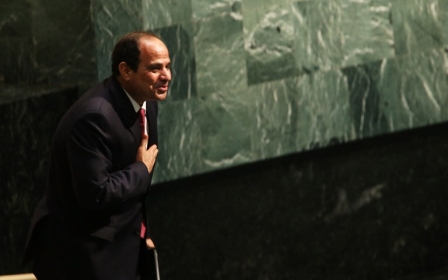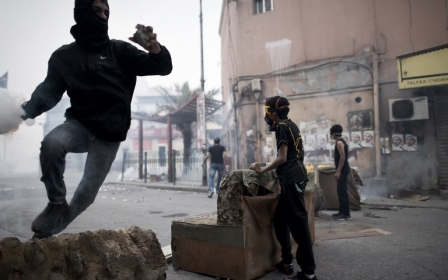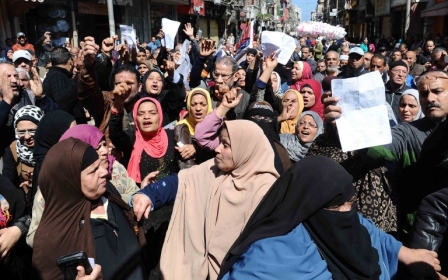Trump, Sisi will not discuss human rights concerns during US visit

US President Donald Trump will not publicly discuss human rights issues in Egypt during a meeting with Egyptian President Abdel Fattah al-Sisi on Monday, signalling yet another departure from Obama’s policy.
Egyptian president Sisi is expected to meet Trump on Monday in Washington. Aides to the White House told the New York Times that the two will focus only on security and economic co-operation. An aide said President Trump prefers to talk about human rights concerns in private and will avoid any public criticism of Egypt.
A White House press briefing released Friday applauded Sisi's campaign against terrorists and his efforts to strengthen Egypt's economy, but it did not allude to his crackdown on domestic opponents.
"President Al Sisi has taken a number of bold steps since becoming president in 2014, including calling for the reform and moderation of Islamic discourse and initiating courageous and historic economic reforms," it said.
The statement said Trump "is excited to welcome Egyptian President al-Sisi to the White House" and that the US president "wants to use President Sisi's visit to reboot the bilateral relationship and build on the strong connection the two Presidents established when they first met in New York last September".
But Human Rights Watch on Sunday said that the meeting between the two leaders displayed their "mutual contempt for human rights"
The visit came at a time, HRW said, "when human rights are at a nadir in Egypt and under threat in the US".
“Inviting Sisi for an official visit to Washington as tens of thousands of Egyptians rot in jail and when torture is again the order of the day is a strange way to build a stable strategic relationship,” said Sarah Margon, Washington director at HRW.
This week's visit marks Sisi's first to the White House since seizing power.
Egypt is one of the US's main allies in the region and it receives $1.3 billion in military aid annually.
Trump and Sisi will discuss co-operation in the fight against the Islamic State, and the Egyptian president will try to attract much needed investments and economic support.
The decision to ignore public criticism of human rights concerns comes after the US State Department lifted the human rights conditions imposed by president Barack Obama on the sale of fighter jets and arms to Bahrain.
The White House could do the same with military equipment used by the Saudis in Yemen and, more generally, abandon the long-standing bipartisan policy of using military aid to strengthen democracy and respect of fundamental rights.
The relationship between Cairo and Washington was strained after Obama criticised Sisi's crackdown on political opponents and denounced Egypt's abuses of human rights.
At a G20 meeting of leaders of major economies in September 2016, Obama snubbed Sisi, who had lined up to shake the president’s hand.
However, Trump and Sisi have met in September in New York and the Egyptian president was the first foreign leader to congratulate his newly elected counterpart on election night. The Egyptian state media vigorously campaigned for Trump, with some political pundits even calling him “the American Sisi”.
The two leaders publicly signaled their mutual admiration and distaste for the Muslim Brotherhood, which Egypt considers a terrorist group not dissimilar from the Islamic State.
Asked whether the US would designate the Brotherhood as a terrorist group, the White House said that no decision had been made, but that Trump was interested in hearing Sisi’s views.
The bipartisan resolution will reaffirm "America's committment to the US-Egypt partnership" and offer support "for Egyptian efforts to confront legitimate threats and stabilize the economy to urge Egypt to ease political repression".
It will also, however, call "for Egypt’s leaders to take steps toward meaningful political and human rights reforms", quoting violations of freedoms and excessive use of force highlighted in the State Department's Human Rights Report of 2016.
"Genuine reform and the opening of space for peaceful political dissent and civil society activity is integral to Egypt’s stability and security,” said Senator Cardin announcing the resolution. “We can’t stay silent, in Egypt or elsewhere, when crackdowns on the media, civil society, and political opponents take place. I look forward to discussing this issue when the Senate Foreign Relations Committee meets with President el-Sisi.”
In December, Republican Senators Lindsey Graham and John McCain said they were in favour of new restrictions on military aid to Egypt. It is Congress that, despite the President's opinion, controls the budget and the disboursement of foreign aid.
Trump’s administration has signalled that it will not tie security and military cooperation to human rights concerns, but said that the White House could not commit to maintaining the same level of aid package under the new budget review.
Sisi will use the visit and a handshake with Trump to bolster his domestic image and as a validation of his presidency despite his human rights record. However, it will be crucial for him to lobby Trump as much as possible to maintain the same level of military aid and try to attract investments for an Egyptian economy in anguish.
Sisi does not make a distinction between the Brotherhood, which says it is peaceful, and Islamic State militants. Egypt considers the Muslim Brotherhood a terrorist group.
Stay informed with MEE's newsletters
Sign up to get the latest alerts, insights and analysis, starting with Turkey Unpacked
Middle East Eye delivers independent and unrivalled coverage and analysis of the Middle East, North Africa and beyond. To learn more about republishing this content and the associated fees, please fill out this form. More about MEE can be found here.







